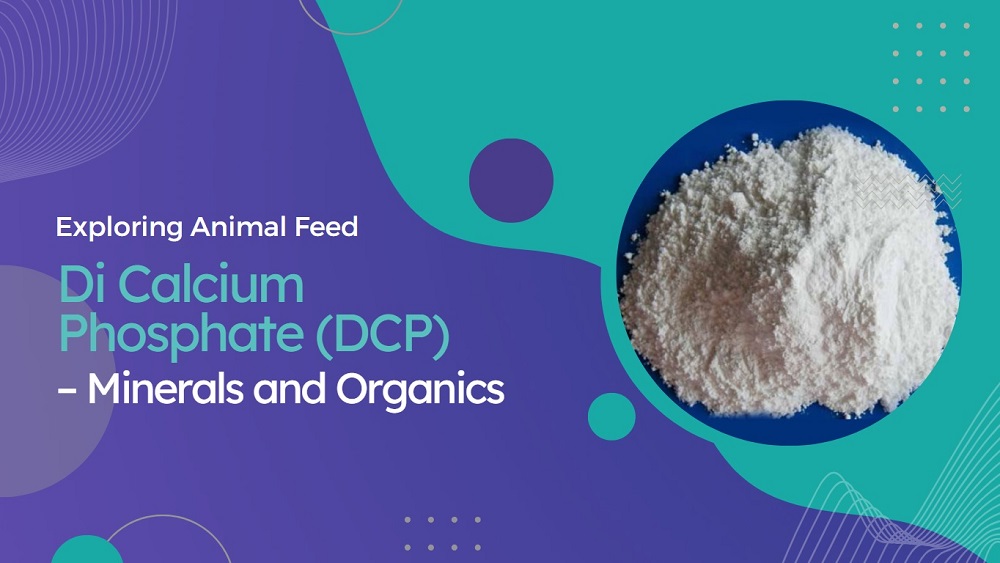Exploring Animal Feed: Di Calcium Phosphate (DCP) – Minerals and Organics

In the vast world of animal husbandry, ensuring proper nutrition for livestock is paramount. Among the many components of animal feed, Di Calcium Phosphate (DCP) stands out as a vital mineral supplement. Let’s embark on a journey to understand its significance and impact on animal health and well-being.
What is Di Calcium Phosphate?
Di Calcium Phosphate (DCP) is a compound commonly used as a mineral supplement in animal feed. Composed of calcium and phosphorus in equal parts, it plays a crucial role in maintaining the overall health and vitality of livestock.
Importance in Animal Nutrition
Animal nutrition is a complex field, and ensuring the right balance of nutrients is essential for optimal growth and performance. DCP serves as a valuable source of calcium and phosphorus, which are fundamental for various physiological functions in animals.
Role in Bone Health
Just as calcium is essential for human bone health, it is equally vital for animals. DCP helps in the formation and maintenance of strong bones and teeth, preventing skeletal disorders and ensuring proper locomotion and structural integrity in livestock.
Enhancing Digestive Health
Proper digestion is key to unlocking the nutritive value of feed ingredients. DCP aids in the regulation of pH levels in the digestive tract, promoting optimal conditions for enzyme activity and nutrient absorption, thereby supporting overall digestive health in animals.
Improving Reproductive Efficiency
Reproduction is a cornerstone of animal agriculture, and DCP plays a significant role in ensuring reproductive efficiency. Adequate levels of calcium and phosphorus provided by DCP are essential for fertility, gestation, and milk production in dairy animals.
Sources of DCP
DCP can be sourced from both mineral and organic sources. Mineral sources include phosphate rock, while organic sources include bone meal and by-products from the food industry. Each source has its unique advantages and considerations in terms of availability, cost, and efficacy.
Dosage and Administration
The correct dosage of DCP depends on various factors such as the animal species, age, weight, and specific nutritional requirements. It is typically incorporated into the feed ration either as a premix or directly mixed with other feed ingredients. Consultation with a veterinarian or nutritionist is advisable to determine the appropriate dosage and administration method for specific livestock.
Safety Considerations
While DCP is generally considered safe for animal consumption, certain precautions should be taken to prevent over-supplementation or contamination. Quality control measures must be implemented throughout the production process to ensure purity and consistency. Additionally, proper storage and handling practices should be followed to maintain the integrity of the product.
Environmental Impact
As with any agricultural practice, it is essential to consider the environmental impact of using DCP in animal feed. Sustainable sourcing of raw materials, efficient manufacturing processes, and responsible waste management are crucial for minimizing environmental footprint and promoting eco-friendly practices in animal agriculture.
Conclusion
In conclusion, Di Calcium Phosphate (DCP) plays a vital role in animal nutrition, contributing to bone health, digestive function, reproductive efficiency, and overall well-being in livestock. By understanding its importance and incorporating it judiciously into feed formulations, farmers can ensure the optimal growth, health, and productivity of their animals while promoting sustainability and environmental stewardship.
FAQs
1. What are the potential benefits of DCP supplementation for livestock?
DCP supplementation can contribute to improved bone health, enhanced digestion, better reproductive performance, and overall well-being in livestock.
2. How is DCP administered to animals?
DCP is typically incorporated into the feed ration either as a premix or directly mixed with other feed ingredients, following recommended dosage guidelines.
3. Are there any safety concerns associated with DCP usage?
While DCP is generally safe for animal consumption, precautions should be taken to avoid over-supplementation and ensure product quality and purity.
4. What are the sources of DCP used in animal feed?
DCP can be sourced from mineral sources such as phosphate rock or organic sources like bone meal and by-products from the food industry.
5. How does DCP contribute to environmental sustainability in animal agriculture?
By promoting efficient use of resources, sustainable sourcing practices, and responsible waste management, DCP usage can help minimize the environmental impact of animal agriculture.
For trade enquiries & partnership, get in touch with us today!
Call Us
Shivam Vasant : +91 9920642235
Office : +9122 – 26821114 / 1115
shivam@shivamchem.com